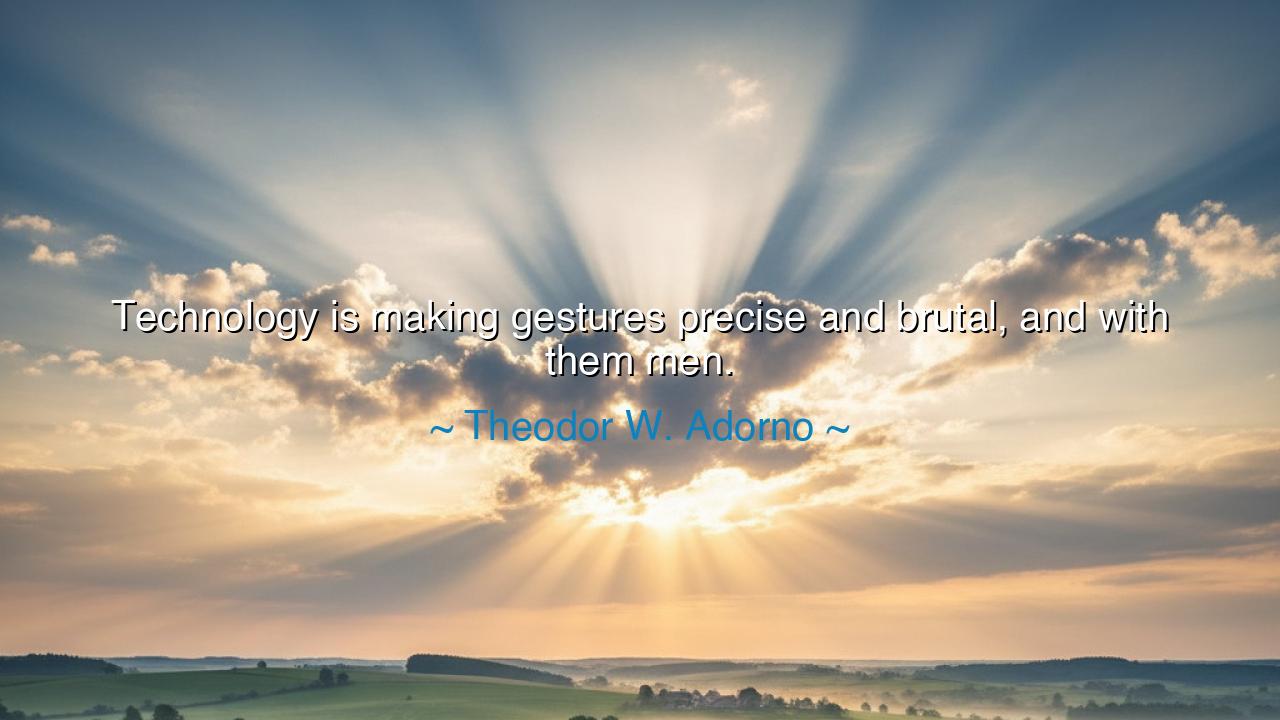
Technology is making gestures precise and brutal, and with them






When Theodor W. Adorno, philosopher of the Frankfurt School, uttered the words, “Technology is making gestures precise and brutal, and with them men,” he spoke with the sorrow of one who had seen the machine age hollow out the human spirit. His words are both poetic and mournful: he saw technology as a force that strips human actions of their gentleness and spontaneity, hardening them into efficient but cruel motions. The gestures of life—once fluid, warm, and human—become sharp, mechanical, and cold. And as the gestures are shaped, so too are the souls of the men who make them.
Adorno lived in the shadow of the 20th century, when assembly lines, war machines, and industrial routines began to dominate human existence. On the factory floor, a worker’s hand no longer moved in freedom but in exact, repetitive motions demanded by the machine. Each gesture became precise, but in that precision it lost its humanity, becoming brutal, stripped of individuality and grace. The laborer was not creating but executing; not shaping but obeying. In this way, the machine’s cold rhythm seeped into the hearts of men, shaping them into reflections of their tools.
History gives us a vivid example in the story of Frederick Winslow Taylor and his “scientific management.” Taylor sought to make factory labor more efficient by analyzing every movement of the worker, timing it, stripping it of waste. What resulted was the birth of “Taylorism,” where human gestures became exact like cogs, optimized like gears. Productivity soared, but the workers themselves became alienated, their actions brutalized by precision, their humanity reduced to mechanical function. Adorno’s words live here: men became mirrors of machines.
But his insight extends far beyond factories. Consider the rise of modern warfare. The soldier of old wielded sword and shield with a kind of intimacy; his gesture carried weight, risk, and honor. But the soldier of the machine age pressed buttons, pulled triggers, released bombs from miles away. The act became efficient, precise, and devastatingly brutal. The gesture was emptied of the closeness of combat, yet magnified in destructiveness. In this way, technology transformed not only the battlefield but the very spirit of man, making him both more distant and more deadly.
Yet Adorno’s teaching is not condemnation alone—it is also a call to awareness. He warns us that the tools we shape also shape us. If our gestures become rigid, so will our souls. If our work becomes mechanical, our minds will echo that same rhythm. Technology is not neutral; it carries within it a philosophy, a way of being. To embrace it without question is to risk becoming less human, precise but cruel, efficient but empty.
O seekers of wisdom, take this lesson into your lives: guard the humanity of your gestures. When you work, do not only move with precision, but with presence. When you use machines, let them serve you, but do not allow them to define you. Remember that your hands were made not only for efficiency, but for kindness, creativity, and care. If the world teaches you to act as a machine, resist it by acting as a man.
Therefore, let Adorno’s words echo within you: “Technology is making gestures precise and brutal, and with them men.” The warning is clear, but so too is the path forward. Seek balance between efficiency and compassion, between precision and gentleness. In every gesture—whether you type, build, or wield—remember to preserve your humanity. For civilization does not advance by machines alone, but by the spirit that moves through human hands, shaping not only tools, but destinies.






AAdministratorAdministrator
Welcome, honored guests. Please leave a comment, we will respond soon